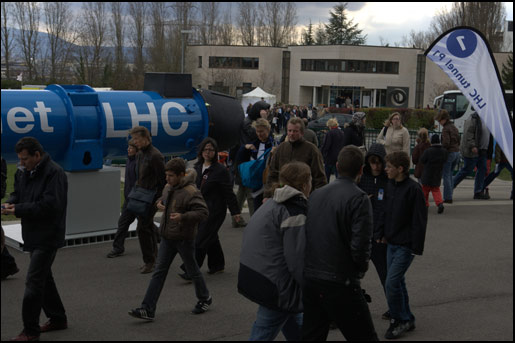
ATLAS e-News
23 February 2011
Open Day '08: "How about those black holes?"
14 April 2008

The recent publicity surrounding the LHC was a hot topic at the Open Day
They say there’s no such thing as bad publicity, but how would recent attempts in a Hawaiian court to stop the opening of the LHC because of safety concerns affect the general public’s perception of CERN? The Open Day on 5-6 April gave the ATLAS Collaboration a chance to find out.
Sofia Chouridou of the the Santa Cruz Institute for Particle Physics at the University of California, was one of many tour guides showing visitors around ATLAS. “The most common question I was asked was about the risk of black holes,” she says. “But the CERN organisation was excellent.” ATLAS had assembled a Wiki page ahead of the Open Days with information to help tour guides answer any questions the visitors might have, and CERN’s LHC FAQ guide was useful too. “Under the safety section, there were several paragraphs explaining the arguments – it was a very useful guide,” says Sofia.
Bertrand Brelier, a PhD student at the Université de Montréal and LPSC in Grenoble, and another Open Day volunteer, agrees. “We explained to the public that we have similar collisions in the high atmosphere of the Earth – we’re only reproducing conditions that exist already.”
Louise Heelan a PhD student at Carleton University, took a different approach to assuaging fears. “On the bus on my way to CERN on Sunday I got talking to a little boy and his mother,” she says. “He said to me: “I read in the New York Times that the probability that the LHC will produce a black hole is less than the probability that dragons will appear and eat the Earth.” And I thought – Wow! I’m totally going to use that quote for the rest of the day!”
Louise was surprised by the absence of protestors, given the recent news from Hawaii. Heidi Sandaker of the University of Bergen agrees. “People seemed calm and relaxed about the whole thing – they were far more interested in the physics behind the LHC.”
If there were any complaints at all, they were due to the long lines at Point One – a sign of how successful the Open Days were. “The queues were much bigger than I was expecting, given that there was little advertising,” says Rudiger Voss, a member of the CERN Muon group in ATLAS. The organisers had expected 2000 visitors on Sunday, but upwards of 3500 took the elevator down to the ATLAS detector.
Even with visitors sometimes queuing for four hours for a trip to the cavern, the crowd remained good-natured, says Thijs Cornelissen of the software tracking group. “I got the job of handing out candy and stickers, which helped to keep people happy,” he says.
